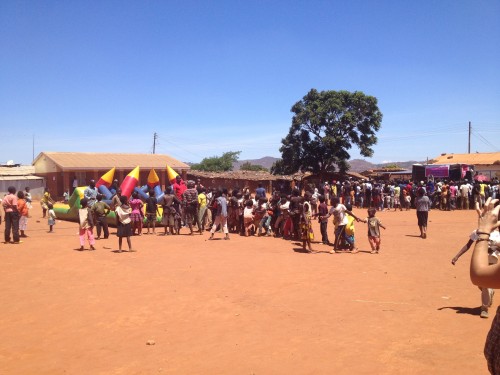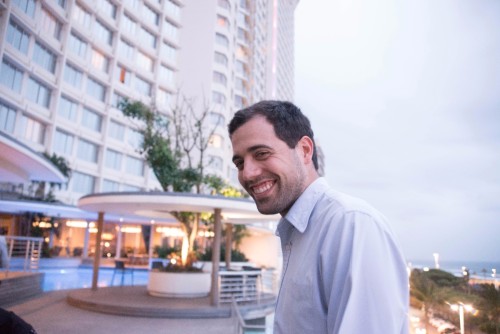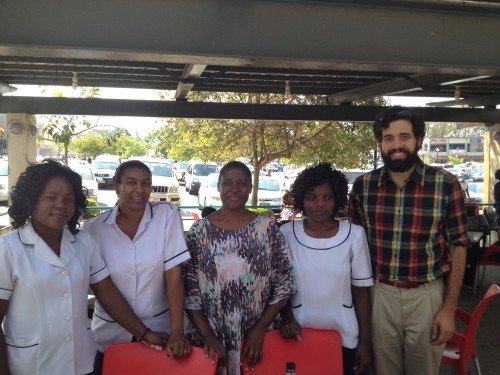Before my year abroad, I decided to pursue a masters of public health at the Brown School of Social Work at Washington University. During the week-long orientation last fall, we had an eight-hour mandatory session on cultural awareness, which included drawing our cultures with crayons on blank sheets of paper and sharing them with the group. Throughout the day, one of the students kept emphasizing how much she has been grappling with her white privilege lately. At the time, I had trouble appreciating what she was referring to, but after almost four months in Africa, my “whiteness” is part of my daily thoughts.
Whether in Uganda, Zambia or Malawi, kids point at me and say “mazungu” or “azungu,” which, depending on the language, means “white person.” Rural children say it the most often. This is commonplace, and I have even seen mothers at the maternity hospital point at me when I walk by, whispering the word to their children, imprinting in their developing minds that this is, in fact, what a white person looks like. I’m not exactly sure why this is an important thing to teach, but I have some theories.
First, being white means I have money. These words were said almost verbatim to me by a coworker — that when people see me and see that I’m white, they automatically think that I must have a surplus of money. My coworkers must also assume this when they insistently request that I should pay for the whole team to take a Saturday trip to the lake. Whiteness equals wealth.
Second, I am a novel creature. I have hair all over my arms and legs. The hair on my head has unusual shapes and doesn’t curl nearly as much as theirs. I am taller than most men here. I look different. This difference makes me acutely aware of my race. I pretend at times that this helps me empathize with minorities’ experiences of racism in the United States, but this racial self-awareness is not the same — it’s as a privileged race. I look different from people here, but my differences mean privilege, power and wealth.
Finally, white is more about privilege than color. My Indian-American housemate is an azungu. My Asian-American coworker is an azungu. But, Malawians with albinism are grouped in with people who have disabilities, according to a billboard with the president’s profile advocating for equal treatment. Albinism is the wrong kind of white skin, and it is much more prevalent than I realized. The Malawians with albinism that I have seen beg for money outside my church. Many are outcasts of society. Their skin color may more closely resemble mine than that of Indians or Asians, but that’s not what azungu or whiteness is about. Being azungu means you have access to social capital and resources.

Children push and line up for a deflated bouncy house. Eventually, the entire house collapsed when the kids were allowed to all jump on it at once.
I recently bought a white car. The students I teach music lessons to in Lilongwe are white — the expatriates are the only ones who budget violin and piano lessons for their children. People still call me Jesus, even though my beard is long gone and my hair is much shorter. I am the only white person who regularly works at the maternity hospital with my research team, and I walk around the clinic and data rooms with an iPhone and a MacBook Pro. Being here makes me incredibly conscious of my azungu self — my wealth, my privilege and my social capital.
Regardless of the country, white may often equal wealth, but it does not always have to mean other. I recently traveled to Durban, South Africa for an AIDS conference, and I was not an other in an urban city where 15 percent of the population is white. Before I spoke and gave away my American accent, I could blend in as a potential South African. In Malawi, that is not the case. The assumption when I am seen is that I am a foreigner, an other. That feeling of being labeled, excluded and isolated can be quite frustrating for someone seeking human connection and engagement with the culture.

I got to stay at a beautiful hotel on the beach in Durban thanks to my fellowship. I ate seafood and traveled due to my social capital.
I am reminded of the medical anthropology courses I took in undergrad, where we were taught the difference between armchair anthropology and field work. You cannot learn a culture from the comfort of your living room sofa, but instead, you must immerse yourself in that culture, sometimes for years. But I begin to question whether that is fully attainable, or to what extent it can be achieved. Even if I wear long pants, regardless of how hot it may be, even if I greet people in Chichewa with the appropriate cultural nuances, even if I eat nsima with my hands and invited people to join with a friendly, “karibu” (a Swahili word that welcomes others to join you in the food you are eating), I still have not fully entered Malawian culture. I am still an other.
In this sense, even if being a minority here is not the same as in the United States because my skin suggests wealth, I can still try to empathize with the feelings of being alone and misunderstood. Because I am foreign, my coworkers inform me of how I have made cultural blunders in my comments or actions — I rarely get the benefit of the doubt. For example, when I did not greet everyone in the room, my behavior was viewed as offensive rather than unaware. People did not seem to consider that I might not be used to the custom of greeting each person individually when I entered a room. Further, my direct nature in addressing problems was interpreted as rude rather than efficient because I was not considering that protecting feelings trumped completing action items. My coworkers had come to think that I was a spy, reporting their misdoings to the Principal Investigator. They did not trust me, which I did not learn about until later on. The power dynamic regarding social interactions and inclusion is still entirely in favor of Malawians, as I struggle to befriend indigenous people rather than expats. Similar to the segregated circles of Asian students, African American students, or Latino students in medical school, the tendency to clump with other expats rather than pursue integration is so tempting.
Global health plunges you into another world. Unless you are returning to your home country, you are an outsider, relatively unaware of that country’s culture regardless of preparation. Your skin color all too readily marks you as that outsider, as someone who is foreign and wealthy. Even if I explain that I am a student on a limited budget, my access to financial resources and social capital makes it difficult to deny my relative wealth. This will be a struggle, but it is a struggle worth enduring and grappling with.
Global health work can seem glamorous, exotic and noble. Lessons in Lilongwe presents introspection and critical observations to illustrate what global health research and living in Africa are really like. Come join Austin on his year off of medical school for a research fellowship in Lilongwe, Malawi.

